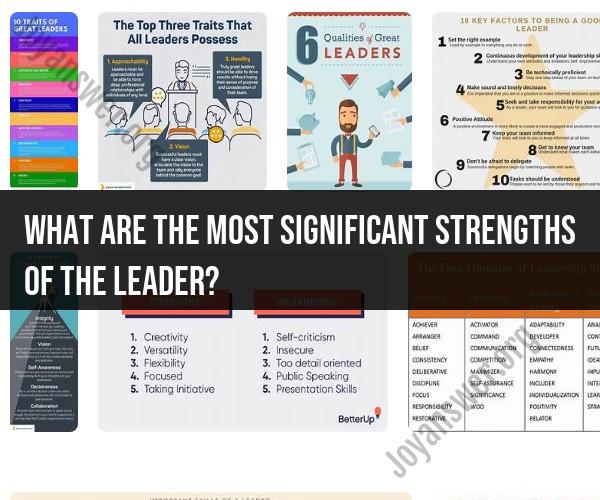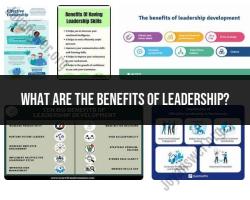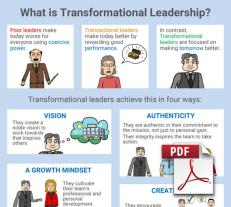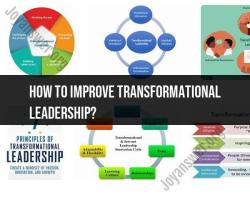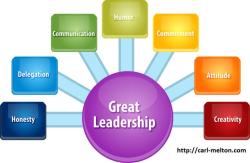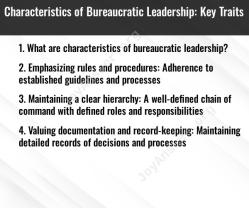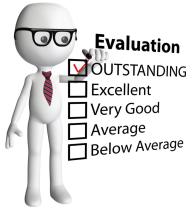What are the most significant strengths of the leader?
Effective leaders possess a variety of significant strengths and attributes that enable them to lead and inspire others. The most significant strengths of a leader often include:
Vision: Leaders have a clear vision and a long-term perspective. They can articulate a compelling vision for the future and inspire their team to work toward it.
Communication: Effective communication is crucial. Leaders are skilled at conveying their ideas, expectations, and feedback, and they actively listen to others.
Empathy: Leaders understand and show empathy toward their team members. They are attuned to the emotions and needs of those they lead and offer support when necessary.
Integrity: Trust is a cornerstone of leadership. Leaders with integrity are honest, ethical, and consistent in their actions and decisions.
Decisiveness: Leaders are capable of making difficult decisions, often under pressure. They gather information, analyze options, and act decisively when necessary.
Adaptability: Leaders are flexible and open to change. They can adapt to new circumstances, technologies, and challenges, and they help their team do the same.
Accountability: They take responsibility for their actions and those of their team. Leaders hold themselves and others accountable for meeting goals and standards.
Inspiration: Effective leaders motivate and inspire their team. They lead by example and encourage their team to excel.
Problem-Solving: They are skilled problem solvers. Leaders identify issues, think critically, and work with their team to find solutions.
Resilience: Leaders bounce back from setbacks and maintain a positive attitude in the face of challenges. Their resilience can inspire their team to do the same.
Team Building: They build and nurture strong teams. Leaders know how to select and develop talent, foster collaboration, and create a positive team culture.
Delegation: Leaders understand the importance of delegation. They trust their team members to take on responsibilities and empower them to succeed.
Conflict Resolution: They can effectively manage conflicts and disputes within the team. Leaders aim to find solutions that benefit all parties.
Strategic Thinking: Leaders have a strategic mindset. They can see the bigger picture and plan for the future, aligning their actions with long-term goals.
Inclusivity: Inclusive leaders value diversity and ensure that all team members are heard and respected. They create an environment where everyone feels included.
Coaching and Mentoring: Effective leaders support the development of their team members. They provide guidance, mentorship, and opportunities for growth.
Innovation: They encourage creativity and innovation. Leaders are open to new ideas and foster an environment where innovative thinking is welcomed.
Time Management: Leaders manage their time effectively, prioritizing tasks and ensuring that important responsibilities are addressed promptly.
Crisis Management: They can effectively manage crises and emergencies, keeping a cool head and guiding their team through challenging situations.
Financial Acumen: In many leadership roles, financial understanding is critical. Leaders need to manage budgets and make financial decisions in the best interests of their organization.
It's important to note that effective leaders may possess a combination of these strengths to varying degrees, and different leadership situations may require different attributes to come to the forefront. Additionally, leadership is a skill that can be developed and refined over time, and leaders often continue to learn and grow throughout their careers.
Identifying the Key Strengths of Effective Leaders
There are a number of key strengths that effective leaders share. Some of the most common strengths include:
- Vision: Effective leaders have a clear vision for the future and are able to communicate that vision to others.
- Communication: Effective leaders are able to communicate effectively with a variety of audiences, both verbally and in writing.
- Decision-making: Effective leaders are able to make sound decisions, even under pressure.
- Problem-solving: Effective leaders are able to identify and solve problems effectively.
- Teamwork: Effective leaders are able to build and lead high-performing teams.
- Emotional intelligence: Effective leaders are able to understand and manage their own emotions, as well as the emotions of others.
Leadership Traits That Drive Success in Various Fields
While the key strengths of effective leaders are generally the same across all fields, there are some leadership traits that are particularly important in certain fields. For example:
- Business: In business, leaders need to be able to think strategically, make quick decisions, and take risks.
- Politics: In politics, leaders need to be able to build consensus, negotiate effectively, and connect with voters.
- Education: In education, leaders need to be visionary, passionate about teaching, and able to motivate students.
- Nonprofit: In the nonprofit sector, leaders need to be compassionate, empathetic, and able to raise funds.
Developing and Enhancing Leadership Strengths
Leadership strengths can be developed and enhanced over time. There are a number of things that you can do to develop your leadership strengths, such as:
- Set goals: Identify the specific leadership strengths that you want to develop and set goals for yourself.
- Get feedback: Ask others for feedback on your leadership strengths and weaknesses. This feedback can help you to identify areas where you need to improve.
- Seek out opportunities: Look for opportunities to practice and develop your leadership skills. This could involve volunteering for leadership roles in your community or taking on new challenges at work.
- Find a mentor: Find a mentor who can provide you with guidance and support as you develop your leadership skills.
Case Studies of Remarkable Leaders and Their Strengths
There are many examples of remarkable leaders who have achieved great things. Here are a few case studies:
- Steve Jobs: Steve Jobs was a visionary leader who co-founded Apple Inc. He was known for his ability to see the future and create products that people loved.
- Nelson Mandela: Nelson Mandela was a courageous leader who fought for racial equality in South Africa. He was known for his compassion and his ability to unite people.
- Mother Teresa: Mother Teresa was a humanitarian who dedicated her life to helping the poor and sick. She was known for her selflessness and her commitment to serving others.
These are just a few examples of remarkable leaders who have achieved great things. Each of these leaders had their own unique strengths, but they all shared a common passion for making the world a better place.
The Impact of Leadership Strengths on Team and Organizational Success
Leadership strengths can have a significant impact on team and organizational success. Leaders who have strong communication skills, are able to make sound decisions, and are able to build and lead high-performing teams are more likely to have successful teams and organizations.
Studies have shown that teams with strong leaders are more productive, more innovative, and more successful. They are also more likely to be satisfied with their jobs and to be committed to the organization.
Organizations with strong leaders are also more likely to be successful. They are more likely to have a clear vision, to make sound decisions, and to be able to adapt to change. They are also more likely to attract and retain top talent.
In conclusion, leadership strengths can have a significant impact on team and organizational success. Leaders who have strong communication skills, are able to make sound decisions, and are able to build and lead high-performing teams are more likely to have successful teams and organizations.
